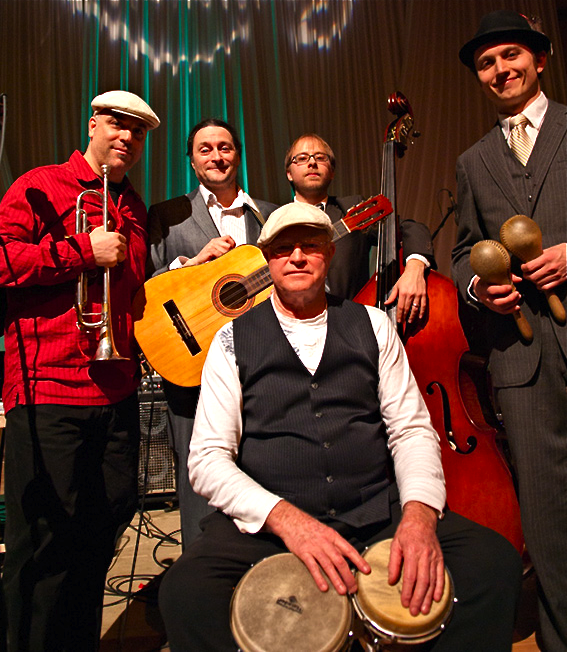“Bajo Oriente” (Downeast) is the debut CD from the Portland-based Cuban music band Primo Cubano. The band is five guys who share a passion for this style of music and who, between them, play a wide array of instruments such as claves, maracas, timbales and congas. GO got schooled on the national music of Cuba, called “son,” about the formation of Primo Cubano and about what makes the band tick from members Marc Chillemi (trumpet, claves, guiro and vocals) and Paul D’Alessio (tres Cubano and vocals). Ready? Vamanos!
Can you give us a brief historical overview?
D’Alessio: The idea for a band like Primo Cubano came during a trip I was able to make to Cuba in 2004. There I first saw and heard the local Cuban bands playing the Son (pronounced like “zone”). Son is the national music of Cuba and the root of all later genres of Cuban music. When I heard and saw and felt that much, and especially the tres Cubano, I knew I could play it. It was already inside me. I took some music lessons from local musicians while I was down there, and when I got home I made a tres out of a three-quarter-size guitar and began learning it. Primo Cubano began to develop out of that.
What exactly is a “tres Cubano?”
D’Allesio: The tres Cubano is a Cuban instrument developed in Cuba to play Cuban music like the Changui, an earlier forerunner of the Son Montuno. The tres is not a guitar and not intended to be played like one. It has three pairs of strings tuned G, C, E with the G and E strung as octaves and the C unison. It’s mostly an African instrument designed to play kalimba-like parts — short, repeating melodic patterns. The tres occupies a place in Cuban music and culture similar to the banjo in American music but without the prejudice. It is universally respected in Cuba and has a warm, cheery, bright, ringing sound that is of that place and suits the music and the people. I think you can begin to know them just by hearing it.
What’s the release date of the CD?
Chillemi: There’s no official release date. Basically this is our official demo CD for sale at shows only. Plus we will host a dance contest at every show where dancers have the opportunity to earn a free CD.
How did you choose the songs for “Baja Oriente?”
D’Allesio: I chose almost all of the repertoire and each song grabbed me in some way. I first heard the local Cuban bands play in Trinidad. “El Cuarto de Tula” is a powerful song and the only Cuban one I knew at all when I went down there. “La Rosa Oriental” is a great example of the older Cuban son songs; sentimental lyrics with the light, swingy tempos and feel of another time. “Son De Le Loma” is a Cuban standard.
Where was it recorded and what was the recording process like?
Chillemi: It was recorded at Acadia Recording Company in Portland in May of 2011. It’s been a long time waiting, and we’re excited to finally have something to help share this beautiful music of Cuba. Our goal in the studio was to try and capture the sound we make when playing live. The five-piece played live in the studio, and we over dubbed the vocals for clarity.
For the most part, the recording represents what you’ll hear at one of our shows. It took about three days for the group to put down all the tracks, and about another three days to lay down the lead vocals and the extras. One of my favorite tracks is our version of “Guantanamera.”
The timing for us to go into the studio was perfect. We had just finished a 14-month weekly residency at Havana South in the Old Port. This gig really helped us develop a core sound and polished arrangements. One night we made a simple live recording at Havana and ended up using some crowd noise on the Guantanamera track. We mixed in the ambiance of the night and added several tracks of singing the chorus and party sounds as kind of a homage to the weekly gig.
Who are the primary influences for Primo Cubano?
Chillemi: Well, there are many, as you can imagine. Here are a few important ones; Benny Mor? H?or Lavoe, Septeto Santiaguero, Septeto Nacional, the Buena Vista Social Club and Miguel Matamoros.
What do you want people around here to know about Cuban music?
Chillemi: How joyful and enriching the music is and how it has changed our lives. It’s amazing how the music from such a poor Third World country is so celebratory and positive. We are so blessed and grateful to be able to play and share this music in the state of Maine and hopefully more parts of New England. We’ve met some Cubans who come to the stage thinking that some of us are Cuban, and are shocked when they learn that we are all gringos living in Maine.
Staff Writer Aimsel Ponti can be contacted at 791-6455 or at:
aponti@pressherald.com
Send questions/comments to the editors.




Success. Please wait for the page to reload. If the page does not reload within 5 seconds, please refresh the page.
Enter your email and password to access comments.
Hi, to comment on stories you must . This profile is in addition to your subscription and website login.
Already have a commenting profile? .
Invalid username/password.
Please check your email to confirm and complete your registration.
Only subscribers are eligible to post comments. Please subscribe or login first for digital access. Here’s why.
Use the form below to reset your password. When you've submitted your account email, we will send an email with a reset code.